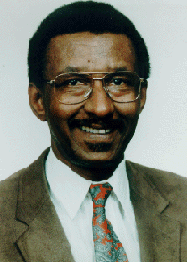|
|
Jewish World Review / Oct. 28, 1998 /8 Mar-Cheshvan, 5759
Walter Williams
THE CENSUS BUREAU reports 36.5 million poor Americans in 1998, nearly 14 percent of our
population.
Both historically and globally, poverty has meant living in destitution, something akin to what
we see in India, Romania and Mexico. For our country, only a tiny fraction of the population
shares anywhere near such a fate.
Robert Rector, a senior policy analyst at the Washington-based Heritage Foundation, has
compiled some little-known data from government reports in an article titled "The Myth of
Widespread American Poverty." Just in case you're interested in checking out his figures,
his sources are: the Department of Commerce, the Department of Housing and Urban
Development, and the Department of Energy.
In 1995, 41 percent of all "poor" households owned their own homes. The average size of
that home was three bedrooms, one-and-a-half bathrooms, a garage and a porch or patio.
Three-quarters of a million "poor" owned homes worth over $150,000; some of those
homes sported Jacuzzis and pools. The average "poor" American has one-third more living
space than the average Japanese, 25 percent more than the average Frenchman, 40
percent more than the average Greek and four times more than the average Russian.
The Census Bureau does a grossly poor job measuring poverty for several reasons. First,
it looks at only current income and ignores assets. Thus, a family of four living in a
$300,000 house with $1 million dollars in the bank, as far as the Census Bureau is
concerned, is poor if for some reason its income was less than $16,404 in 1997.
The Census Bureau also misses income. In 1995, the Census Bureau claimed that the
lowest income fifth of households had an average income of $8,350. In the same year, the
Department of Labor's consumer expenditure survey showed that the same lowest fifth of
households spent $14,607. The Labor Department's survey shows $1.75 worth of
spending for each $1 the Census Bureau claims that household possesses.
Real material poverty, to any significant degree, simply does not exist in the United States.
The bulk of our "poor" live under conditions that would have been judged comfortable or
even well-off a few generations ago. The nonsense maxim that "the rich get richer and the
poor get poorer" just doesn't stand up to the evidence. The fact is everyone has become
richer.
Poverty of the spirit and dependency are today's problems. Many people's lifestyle choices
doom their chances for upward mobility. They freely make devastating choices like
dropping out of school, having illegitimate children, abusing drugs and alcohol, refusing to
work, and engaging in criminal activity.
Focusing most of our attention on material poverty, to the neglect of spiritual poverty and
dependency, is not the best way to help our more unfortunate brethren. But misleading
Americans about material poverty provides federal budgets and programs that enhance the
status and incomes of the poverty elite in charge of managing the
 Where are the poor?
Where are the poor?
 Seventy percent of "poor" households own a car; 27 percent own two or more cars.
Ninety-seven percent have a color television; nearly half own two or more televisions.
Two-thirds of "poor" households have air conditioning. By contrast, 30 years ago, only 36
percent of the entire U.S. population enjoyed air conditioning. America's "poor" people
aren't hungry, either. In fact, "poor" people are more likely to be overweight than
higher-income people. The average consumption of proteins, vitamins and minerals is
virtually the same for poor as middle-income children, and in most cases above
government recommended minimums.
Seventy percent of "poor" households own a car; 27 percent own two or more cars.
Ninety-seven percent have a color television; nearly half own two or more televisions.
Two-thirds of "poor" households have air conditioning. By contrast, 30 years ago, only 36
percent of the entire U.S. population enjoyed air conditioning. America's "poor" people
aren't hungry, either. In fact, "poor" people are more likely to be overweight than
higher-income people. The average consumption of proteins, vitamins and minerals is
virtually the same for poor as middle-income children, and in most cases above
government recommended minimums.

10/21/98: The budget surplus hoax
10/15/98: Where union power lies
10/08/98: Race and sex in the military
9/29/98: Can Clinton run the economy?
9/25/98: Liberals and the constitution
9/17/98: Clinton and future presidents
9/11/98: Donate or sell organs
9/03/98: Common Sense vs. Experts
8/26/98: Mother Nature's unfairness
8/24/98: The pretense of superiority
8/13/98: Yours or mine?
8/05/98: I do my job well, so that means I can....
7/29/98: Education production